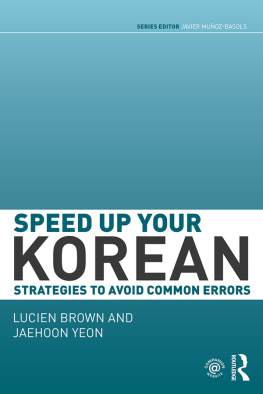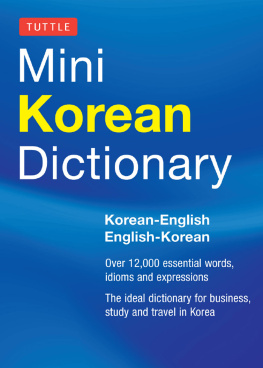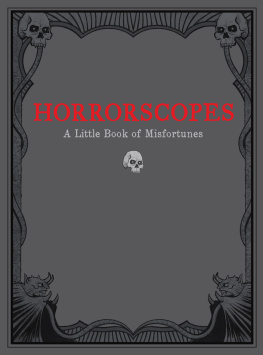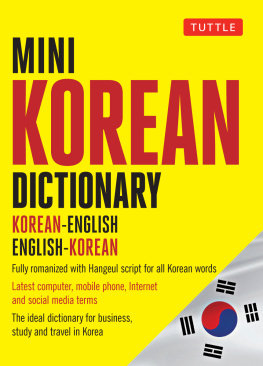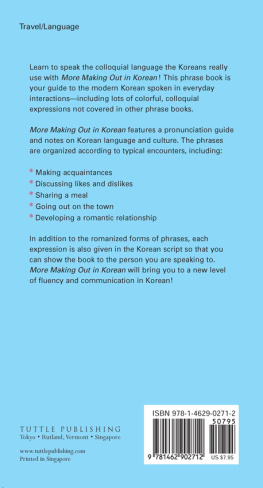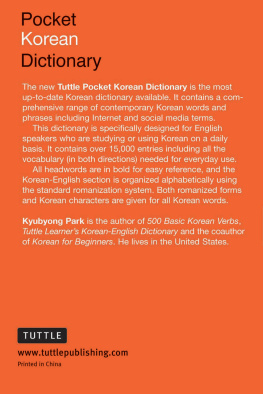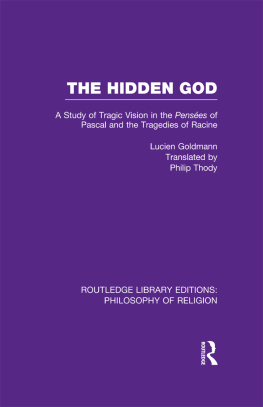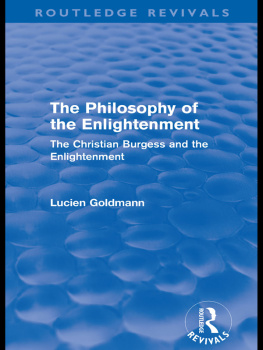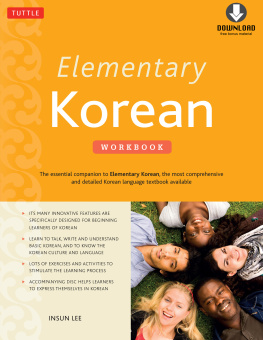Brown Lucien - Speed up Your Korean
Here you can read online Brown Lucien - Speed up Your Korean full text of the book (entire story) in english for free. Download pdf and epub, get meaning, cover and reviews about this ebook. year: 2016, publisher: Routledge;Taylor and Francis, genre: Children. Description of the work, (preface) as well as reviews are available. Best literature library LitArk.com created for fans of good reading and offers a wide selection of genres:
Romance novel
Science fiction
Adventure
Detective
Science
History
Home and family
Prose
Art
Politics
Computer
Non-fiction
Religion
Business
Children
Humor
Choose a favorite category and find really read worthwhile books. Enjoy immersion in the world of imagination, feel the emotions of the characters or learn something new for yourself, make an fascinating discovery.
- Book:Speed up Your Korean
- Author:
- Publisher:Routledge;Taylor and Francis
- Genre:
- Year:2016
- Rating:4 / 5
- Favourites:Add to favourites
- Your mark:
- 80
- 1
- 2
- 3
- 4
- 5
Speed up Your Korean: summary, description and annotation
We offer to read an annotation, description, summary or preface (depends on what the author of the book "Speed up Your Korean" wrote himself). If you haven't found the necessary information about the book — write in the comments, we will try to find it.
Speed up Your Korean — read online for free the complete book (whole text) full work
Below is the text of the book, divided by pages. System saving the place of the last page read, allows you to conveniently read the book "Speed up Your Korean" online for free, without having to search again every time where you left off. Put a bookmark, and you can go to the page where you finished reading at any time.
Font size:
Interval:
Bookmark:
First published 2016
by Routledge
2 Park Square, Milton Park, Abingdon, Oxon OX14 4RN
and by Routledge
711 Third Avenue, New York, NY 10017
Routledge is an imprint of the Taylor & Francis Group, an informa business
2016 Lucien Brown and Jaehoon Yeon
The right of Lucien Brown and Jaehoon Yeon to be identified as authors of this work has been asserted by them in accordance with sections 77 and 78 of the Copyright, Designs and Patents Act 1988.
All rights reserved. No part of this book may be reprinted or reproduced or utilised in any form or by any electronic, mechanical, or other means, now known or hereafter invented, including photocopying and recording, or in any information storage or retrieval system, without permission in writing from the publishers.
Trademark notice: Product or corporate names may be trademarks or registered trademarks, and are used only for identification and explanation without intent to infringe.
British Library Cataloguing-in-Publication Data
A catalogue record for this book is available from the British Library
Library of Congress Cataloging-in-Publication Data
Names: Brown, Lucien, author. | Yeon, Jaehoon, author.
Title: Speed up your Korean : strategies to avoid common errors /
Lucien Brown and Jaehoon Yeon.
Description: Milton Park, Abingdon, Oxon ; New York, NY : Routledge, [2016] |
Includes bibliographical references and index.
Identifiers: LCCN 2015040483| ISBN 9780415645034 (hardbook : alk. paper) |
ISBN 9780415645041 (pbk. : alk. paper) | ISBN 9781315638263 (ebook)
Subjects: LCSH: Korean languageErrors in usageHandbooks, manuals, etc. |
Korean languageUsageHandbooks, manuals, etc. | Korean language
Study and teachingForeign speakers.
Classification: LCC PL927.6 .B76 2016 | DDC 495.782/421dc23
LC record available at http://lccn.loc.gov/2015040483
ISBN: 978-0-415-64503-4 (hbk)
ISBN: 978-0-415-64504-1 (pbk)
ISBN: 978-1-315-63826-3 (ebk)
Typeset in Swiss 721 and Palatino
by Apex CoVantage, LLC

This book looks at common areas of difficulty and sources of errors for learners of Korean. Although the book is designed primarily for English speakers, many of the problem areas that we look at may affect learners from all language backgrounds. Our belief is that, through the identification of these areas of difficulty, common errors can be reduced and accuracy and fluency can be promoted.
This book was inspired by the inaugural Routledge publication in this series Speed Up Your Spanish: Strategies to Avoid Common Errors by Javier Muoz-Basols, Marianne David and Olga Nez Pieiro. We were impressed by the approach taken by this book, and we were keen to apply it to Korean. However, many of the categories appearing in Speed Up Your Spanish such as gender, number and false friends do not really apply to a non-European language such as Korean. Therefore, Speed Up Your Korean has inevitably developed into a quite different book to Speed Up Your Spanish .
We focus on pronunciation, grammar and vocabulary choices that are notoriously troublesome (particularly for English speakers), typically because Korean does things in a different way and presents the learner with choices not present in their native language. We highlight differences from English and provide simple rules of thumb for correct use of the items in question. Where possible, we provide shortcuts for remembering pronunciation rules, grammar rules and vocabulary.
One of the key goals of the book is to explain differences. We have found from our own teaching experience that students often want to know what the difference is between two Korean grammatical patterns or words that appear to have similar usage or meaning. However, to date these differences have rarely been explained thoroughly in Korean teaching materials, which often present grammatical patterns linearly with no comparison offered between those of similar meaning.
between the way that Korean is written and the way it is pronounced. We provide practical tips for making your pronunciation more native-like.
The next four chapters all focus on different areas of grammar. discusses how particles (as well as word order) are used to determine the grammatical role of nouns in Korean sentences. Student will learn how to differentiate between pairs of particles that are easily confused (e.g. the subject particle / and the topic particle /), and see what happens when multiple particles occur together on the same noun.
In , students will learn about various verb endings that are known to be difficult for language learners.
covers an area of Korean grammar that is intricately related to Korean culture: the use of honorific forms. We provide useful tips to ensure that you are using the correct level of politeness and not causing any offense in your day-to-day interactions with various Korean speakers.
The final two chapters focus on vocabulary. looks at untranslatable words: Korean words that lack direct English equivalents. Through mastering the use of these words, students can make their Korean sound more natural and also display understanding of Korean culture.
covers collocation the way that particular words tend to occur together in Korean sentences. To speak Korean accurately, learning individual vocabulary items may not be sufficient. Students of Korean need to know how these vocabulary items normally combine with each other in order to produce natural, idiomatic Korean sentences.
The book contains practice activities distributed throughout the book. These activities give you the opportunity to put the theory into practice and develop your accuracy in Korean. As much as possible, the activities are designed to mimic the grammatical and lexical choices that you will encounter when you are speaking (or writing) Korean in the real world. Answers to the exercises can be found at the back of the book.
Many of the grammatical descriptions in this book rely heavily on our previous book Korean: A Comprehensive Grammar , which was published by Routledge in 2011. We would like to recommend that readers refer to this book should they require further information about the grammatical items under discussion.
Finally, we would like to thank the Academy of Korean Studies of the Republic of Korea for supporting this project. This work was supported by the Academy of Korean Studies (KSPS) Grant funded by the Korean Government (MOE) (AKS-2011-BAA-2104). We are also grateful to Hyojin An for her valuable assistance with the exercises.
adverbs
aspirated consonants
auxiliary verb (patterns)
bases, verb
causal connective endings
causatives
Chinese characters
collocations
commands
conditionals
connective endings
consonants
continuous tense
copula
discourse markers
double consonants
exclamations
familiar style
final consonants
first person pronouns
formal style
future tense
Hangul
honorifics
idiomatic expressions
imperatives
infinitive form
instrumental particles
intentions, expression of
intimate style
irregular verbs
kinship terms
lax consonants
loan words
location, particles of
long negation
modifiers
movement, particles of
movement, verbs of
negation
North Korea
numbers
object particle
one-shape verb endings
particles
passives
past tense
personal pronouns
Font size:
Interval:
Bookmark:
Similar books «Speed up Your Korean»
Look at similar books to Speed up Your Korean. We have selected literature similar in name and meaning in the hope of providing readers with more options to find new, interesting, not yet read works.
Discussion, reviews of the book Speed up Your Korean and just readers' own opinions. Leave your comments, write what you think about the work, its meaning or the main characters. Specify what exactly you liked and what you didn't like, and why you think so.

